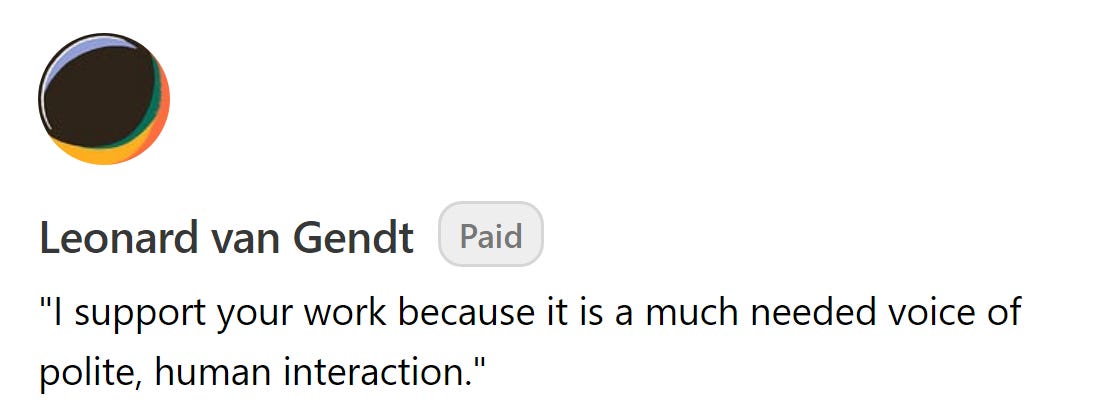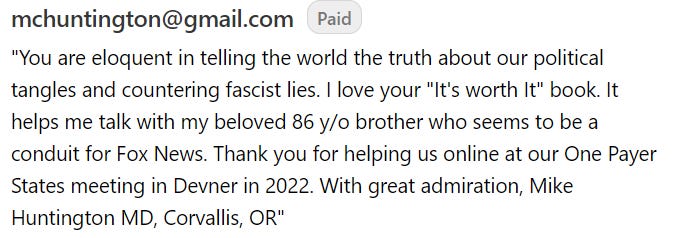Imagine if, instead of building bombs, we built an America of truth, fairness, and opportunity.
Too often, Americans are left out of the policies that make us a fair country that provides opportunity to all. Imagine! My KPFT morning rant is one we need to hear.
NOTE: We need 300 new paid subscriptions to meet October’s goal! Please make a difference.
We are grateful for our Paid Subscribers and Free Subscribers. In this political climate, we need several hundred more Paid Subscribers. Misinformation funded by the deep pockets of our Oligarchy floods the internet. We are using all our platforms on-air, online, and in publications to counter that. We ask that you invest the equivalent of less than a coffee to ensure we can keep doing this effectively. Please invest in a Democracy that serves all of us by becoming a paid subscriber. It comes with many benefits.
Imagine if, instead of building bombs, we built America.
Summary of Transcript:
The video discusses the overemphasis on military spending in the U.S. and the potential for a better future if resources were redirected toward infrastructure, education, and public welfare. It critiques the media’s role in perpetuating misinformation and highlights the need for policies that uplift working-class Americans. The discussion also touches on the economic exploitation underlying America’s comfort and challenges the status quo in journalism and politics.
The U.S. spends more on its military than the next eight countries combined, draining resources from domestic needs.
Reallocating military funds could address critical infrastructure issues, like water management and climate adaptation.
Federal policies such as the CHIPS Act and the Inflation Reduction Act have created union jobs despite Republican opposition.
Corporate interests constrain mainstream media and often omit critical truths from its reporting.
American wealth and comfort are built on the exploitation of labor and resources from the Global South.
The video calls for a dramatic shift in American priorities, advocating for investments in people and infrastructure rather than endless military spending. By embracing policies that benefit the working class, challenging corporate-controlled media, and addressing global exploitation, America can begin to live up to its ideals of fairness and democracy for all.
The United States stands at a critical juncture where it must rethink its priorities if it genuinely seeks to be a beacon of freedom, justice, and equality for all. For too long, the nation has poured its resources into militarization, a strategy built on the false premise that global dominance ensures security. But this model, with its enormous financial costs and its perpetuation of violence and conflict abroad, has failed to bring peace, stability, or prosperity to the American people. Imagine, instead, if America redirected its resources from building bombs to building a society rooted in truth, fairness, and opportunity for all.
Here is a thought: “America better take a second look at itself before the bombs start falling here.” This chilling thought speaks to the dangers of a militarized foreign policy, one that sows seeds of hatred, animosity, and endless conflict. The U.S. has maintained hundreds of military bases worldwide, with a military budget far exceeding that of any other nation. America’s defense budget surpasses the combined budgets of the next nine largest military spenders, including China, Russia, and key NATO allies. This overwhelming investment in the military might drain the nation of resources that could be used to improve the lives of its citizens.
Now, consider what could be achieved if even a fraction of that funding were reallocated to infrastructure, education, healthcare, and social justice. Imagine a future where America builds bridges instead of bombs, and investments flow into creating canals to move water from flood-prone areas to drought-stricken regions rather than creating ever more sophisticated means of destruction. This vision is not only utopian but entirely possible. The technology exists, the resources are there—it is merely a question of political will.
Building an America of truth, fairness, and opportunity means putting people before profits, community before corporations, and the common good before the interests of the military-industrial complex. The United States has a fiat monetary system, essentially creating its currency. Critics of social spending often ask, “Where will the money come from?” The government already creates money for military purposes. Why not for healthcare? Why not for education? The only real difference is priorities.
There is a connection between federal policies and the lives of everyday working Americans. For example, the Inflation Reduction Act (IRA) and the CHIPS Act are creating good-paying union jobs—policies the Republicans opposed but that the Democrats passed. These are the kinds of investments that truly uplift people. Yet, there is still a disconnection between the benefits of these policies and how they are perceived by the workers who stand to gain from them. Many older union workers understand that Donald Trump’s tax cuts for the wealthy did nothing for the working class. However, younger workers, less informed, are more susceptible to the rhetoric of populism without the substance of real policy.
This disinformation problem is part of a broader crisis in American democracy. The media plays a central role in shaping perceptions, and mainstream media too often omits critical truths because of corporate interests. Whether it’s MSNBC, CNN, or Fox News, the corporate media landscape is limited in how far it can go in challenging the status quo. These outlets, funded by pharmaceutical companies, defense contractors, and other corporate interests, cannot thoroughly critique the system that underpins their existence. Journalists are constrained by the very structures they are supposed to hold accountable. This raises the question: can America truly build a fairer, more truthful society when its media is beholden to the interests it should be critiquing?
Imagine a media landscape where journalists were free to report without fear of retribution from corporate sponsors, where they could expose how America’s military-industrial complex siphons resources away from the people who need them most. Imagine if, instead of headlines glorifying military conquests, we saw stories about how new schools, bridges, and hospitals were built in underserved communities.
Furthermore, building a more just society requires recognizing America’s role in the global system of exploitation. Much of the wealth and comfort enjoyed in the West is built on the backs of exploited labor in the Global South. From children mining rare earth minerals for electric car batteries to workers in sweatshops making the clothes we wear, the comforts of American life are often abstracted from the suffering of others. This economic system thrives on a false separation between the consumer and the worker, allowing Americans to turn a blind eye to the injustices that sustain their lifestyle.
The United States has a choice: to funnel resources into a destructive, exploitative system nationally and internationally or invest in a future of truth, fairness, and opportunity. By shifting focus from militarization to the well-being of its own people and the global community, America can become the country it claims to be—a true democracy that works for everyone, not just the few. The path is clear, but it requires courage to change course and imagine a world built not on bombs but bridges. And it starts with you.
Viewers are encouraged to subscribe and join the conversation for more insightful commentary and to support progressive messages. Together, we can populate the internet with progressive messages that represent the true aspirations of most Americans.
Can we count on your help to reach our goal of 300 needed new paid subscriptions by the end of the month?
The other side has big donors and everyday citizens who invest heavily in platforms that lie and misinform. All we have is you. So, please invest in our media outlet by clicking the subscribe button below to become a paid subscriber. You won’t miss that coffee, but it will make a difference in our politics as we spread the truth about our policies and progressive politics. All paid subscribers get to read my five books on this platform and all subsequent books I write. They will also be privy to subsequent incentives.







Egberto, you mention "investment". Well and good. Perhaps the term needs a formal definition, such as "the action or process of investing money for profit or material result" (Oxford).
From a progressive standpoint, this could mean results for the common good and not military domination / empire-building. Eisenhower framed the guns-vs-butter debate this way.
In the broadest sense, bombs are already falling here. 9/11 happened ONLY because the US maintained (and still maintains) military bases in Saudi Arabia — anathema to a guy named Obama bin Laden. It radicalized him. Being an enterprising sort from a rich family, he decided to do something about it. The rest, as they say, is history.
A different type of disastrous cost: AIPAC massively corrupts US politics mainly to feed Israel military resources to crush Palestinians resisting occupation and dispossession. Palestinian families pay with their lives. We pay with the corruption of American democracy, such as it is.
As you note, we have a fiat currency. It gives us unparalleled freedom to invest and spend as we please. We’re squandering this flexibility on things that don’t benefit the public good, especially the military. Our economy suffers.
Historically when America emerged from a war, we experienced a “peace dividend”. Military spending slid while public works investment soared. Have you noticed, no one (read: corporate media) talks about a “peace dividend” anymore? And hasn’t for decades? That’s because we now spend more on military after a war than during it.
From this perspective we’re in an endless state of war, much as Orwell predicted in his “1984” dystopia. We’re living it, and don’t even notice. This boil-the-frog normalization reflects a whole other level of corruption and decline. IMHO, we need a widely publicized index (updated, say, weekly or monthly) that exposes this contrast — a ratio of military spending to public investment. Something like that.
Egberto, because you have a public platform, maybe you could team up with folks from Rice, or Brown University’s Cost of War project, plus Win Without War, the Quakers and other peace orgs, to make this happen? The objective: to shift public perception (or, if you will, shift the Overton window). You're a super busy guy, so if you’re interested I’d be glad to help frame this up as a formal proposal, and help shop it around.
I would like to begin with a quote from a speech by President Dwight D. Eisenhower, known as "The Chance for Peace":
"Every gun that is made, every warship launched, every rocket fired signifies, in the final sense, a theft from those who hunger and are not fed, those who are cold and are not clothed.
"This world in arms is not spending money alone. It is spending the sweat of its laborers, the genius of its scientists, the hopes of its children."
About a decade after this speech was given, R. Buckminster Fuller did the math and found that all resources needed for every human to live and thrive, everywhere in the world, could be provided if every nation on Earth repurposed just 25% of its military/war spending. That was in the 1970s. Peace and plenty, worldwide, for 25% of the price the world was already willing to pay for war. [Buckyworks, p. 201, J. Baldwin, 1996]
Over half a century later, we are still not ready to make this relatively small commitment, this investment in the well being of every member of our species. Why? Mostly greed, pride and a love of power. For all of recorded history, resources were a zero-sum game; one man's gain was always another man's loss. Now that this no longer has to be the case, those who hold power continue to cling to it, creating artificial shortages to hide the fact that the zero-sum game is already over. In a just world, the outcome of the game is simple: We all win. I would love to live in a just world.